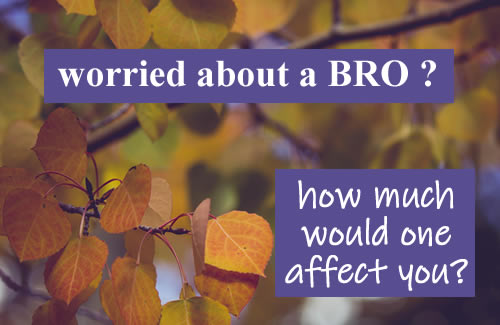
Here are some recent questions from people worried about going bankrupt and possible Bankruptcy Restriction Orders (BROs):
I gambled a lot but stopped over a year ago. I want to apply for bankruptcy, but will I get a bankruptcy restrictions order?
I have credit card debts which I can’t pay as I have had to stop work because of a disability. I went bankrupt in 2008 and had a DRO in 2018. Will I be penalised if I go bankrupt again?
I took out a personal loan and on the application said it was to repay debts. I repaid part of my debt but used the other half for a holiday & general living expenses. I paid it until I lost my job in lockdown. Can I go bankrupt?
Nothing like this is going to stop you going bankrupt. It is very rare for a bankruptcy application to be rejected. Will my bankruptcy application be refused? lists some of the unusual reasons why this can happen.
Some people may get a Bankruptcy Restrictions Order (BRO) if the Official Receiver thinks they have been dishonest or to blame for their debts.
That may sound scary – most people think they are to blame in some way for having to go bankrupt… but BROs are actually quite unusual. And the number of people that get them is reducing.
Contents
What is a BRO?
Restrictions for a longer period
Normally in bankruptcy you are discharged from your debts and the bankruptcy restrictions end after a year.
A few people get a BRO and have these restrictions extended for between two and fifteen years. That’s why it is called a Bankruptcy Restrictions Order.
The BRO restrictions are listed here. Extending the time of these restrictions is the only effect of a BRO:
- with a BRO you are still be discharged from your debts after a year;
- if you have to make monthly payments – most people don’t! – that will still only be for three years;
- a BRO doesn’t mean you have to pay more, or for longer.
How is a BRU different?
A BRO is an order imposed by the court. A Bankruptcy Restriction Undertaking (BRU) is an undertaking that you choose to give, without it going to court.
If the Official Receiver thinks you should get a BRO because of something you have done, you will be offered the chance to agree to a BRU instead. If you do not accept, the Official Receiver will go to court for a BRO.
A BRU is exactly the same as a BRO but it is normally slightly shorter in length as you are accepting that your conduct was wrong.
There are very few BROs as most people decide to accept the shorter BRU. In 2021-22, the Insolvency Service says there were 11 BROs and 303 BRUs.
If you aren’t sure if you should agree to a BRU because you feel it is unfair, talk to a debt adviser about your situation.
In the rest of this article I just say BRO, but everything also applies to BRUs.
Debt Relief Orders – DRROs are very similar
A DRRO is a Debt Relief Restriction Order. It is the equivalent of a BRO for someone who chooses a Debt Relief Order instead of bankruptcy. The reasons you might get one are the same as for a BRO and the restrictions are also the same.
As you might guess, a DRRU is an undertaking you agree to instead of a DRRO.
In the rest of this article, I only talk about BROs, but most of it also applies to DRROs.
Why might someone be given a BRO?
What behaviour can lead to BRO?
Some examples of behaviour before you go bankrupt that can lead to a BRO include:
- giving away money or assets, or selling them for less than their value;
- paying some creditors in preference to others;
- borrowing money you knew you couldn’t repay;
- gambling or reckless speculation;
- neglecting your business so your debts increase or not paying the correct tax;
- behaving dishonestly, eg giving false details to obtain credit. A common reason for BROs after 2022 has been fraudulent applications for Bounce Back loans during Covid.
A BRO may also be given for something that happens when you go bankrupt or afterwards, such as not cooperating with the Official Receiver, not declaring assets or deliberately lying.
It is important to emphasise that you won’t definitely get a BRO for one of these things – hence the very low numbers of BROs! But the Official Receiver will look at what happened.
What sort of things will the OR consider?
There are no clear cut rules here – the OR will look at all the facts of your case. That’s why a debt adviser often can’t give a definite Yes or No answer if you ask them if you will get a BRO. But they can often say if one is more likely or is unlikely.
Here are some of the factors that may be relevant.
How long ago was it?
How much money was involved?
Did it contribute significantly to your bankruptcy?
Did you give some money or assets away only few days or weeks before going bankrupt or when you already had a Statutory Demand from a creditor so you knew you were likely to be made bankrupt?
A few months before bankruptcy you may have used a few hundred pounds of remaining credit on a credit card without thinking much about it. But if you applied for a £10,000 loan you should have considered whether you could afford the repayments.
What did you use the credit for?
If you took a loan and used it to repay some payday loans and credit cards, then your overall debt level didn’t increase, so the OR is unlikely to consider that the new borrowing was reckless.
Replacing a broken washing machine at a point where you hadn’t decided to go bankrupt was probably a sensible decision, but using redundancy money to take the family to Disneyland wouldn’t have been.
Were you insolvent at the time?
Perhaps you or your partner lost your job, had your hours cut a lot, became seriously ill? If you had been repaying your debts without any problem until things went badly wrong, then what you did before that point is unlikely to be regarded as blameworthy.
How many people get BROs & how long are they?
How long are BROs?
I looked at all 58 BROs issued in a period of three months in 2020. About two-thirds of BROs were for 4 years or less. Here are the details:
| length | number |
| 2y 6m | 1 |
| 3y | 2 |
| 3y 6m | 22 |
| 4y | 13 |
| 5y | 6 |
| 6y | 7 |
| 7y | 4 |
| 9y | 2 |
| 12y | 1 |
The long BROs were given for cases where there was significant dishonesty involved or very large sums of money. Examples included a tax debt of over £200,000, stealing from an employer, and giving a house worth £250,000 to a relative. The 12-year BRO was on an IFA who stole hundreds of thousands of pounds from his clients and who had been sent to prison for 6 years for fraud.
From 2022, the number of long BROs seems to have increased significantly because of fraudulent Bounce Back loan applications in Covid.
Falling numbers of BROs?
The Insolvency Service used to say that about 3% of bankruptcy cases result in a BRO/BRU.
Only 131 BRO/BRUs were obtained from April 2024 to March 2025. During this period, there were over 7,000 bankruptcies, so the percentage of cases resulting in a restriction seems to have dropped to under 2%.
The Insolvency Service says:
A very small number of individuals are found to have committed misconduct or acted in a reckless or culpable manner that required extending the restrictions of bankruptcy.
Does it matter if you do get a BRO?
Of course you would prefer not to get a BRO, but it often isn’t a serious problem if you do. The restrictions that result in a BRO are listed here.
Would any of them really matter to you?
- most people find it hard to borrow much money for the six years while bankruptcy is on your credit record, so if you get a BRO for 4 years say, is the ban on borrowing more then £500 in that time important?
- not many people want to be local councillors, MPs or IFAs.
- a press release may sound alarming – but it doesn’t often happen. There probably was a press release about the person who had a 12 year BRO in the sample I looked at.
In the end, it may come down to whether you have a sensible alternative to bankruptcy. If a debt adviser has said bankruptcy is a good option for you, then you probably don’t have a better alternative.
Making very low payments for many years can be very stressful and isn’t going to solve your problem. Bankruptcy gives you a clean start, with no worries about debt collectors, CCJs or bailiffs.
Choosing an IVA can go very badly wrong. You have to make payments for much longer than in bankruptcy and a high proportion of IVAs fail when people can’t manage the payments that sounded affordable at the start. You should only consider an IVA if you have assets to protect, in which case bankruptcy usually isn’t a good idea.
Summary
A BRO means there are extra restrictions on what you can do when you discharged from bankruptcy.
BROs are actually quite rare. A lot more people worry about them than ever get one.
And for most people, a BRO makes very little difference to their life.
Everyone who decides to go bankrupt should get good, independent debt advice about whether bankruptcy is the best option for you. So if you are worried about a BRO, talk to your debt adviser about this:
- phone National Debtline on 0808 808 4000;
- if you are self-employed or have a small limited company, phone Business Debtline on 0800 197 6026.



Kirsty says
Is it possible to get a BRO after being discharged from bankruptcy if the Official Receiver realises you gambled before discharge? I was discharged almost a year ago but still worry that I’ll get a BRO. I didn’t realise at the time that I wasn’t allowed to.
Sara (Debt Camel) says
The government says:
The official receiver must apply to court for a BRO before your discharge, unless they have permission from the court to apply later.
Getting permission to apply later would be very unusual.
How large was your gambling during the year after your bankruptcy and before your discharge? Did you borrow any money to fund this?
nigel says
Hi Kisrty,
If you ever see this may I ask if you had a meeting with your OR?